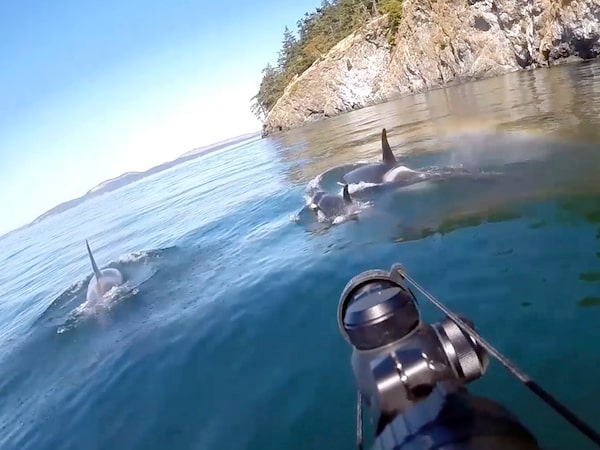
Dr. Martin Haulena, head veterinarian at Vancouver Aquarium, administers antibiotics to J50 using remote injection. He is onboard a research vessel from University of Washington Friday Harbor Labs, driven by killer whale expert Dr. Deborah Giles.Vancouver Aquarium/Vancouver Aquarium
The federal government has extended the protected area for Southern resident killer whales as it prepares to return to the National Energy Board for a reconsideration of measures needed to lessen the impact of the Trans Mountain pipeline expansion on the endangered species.
The Federal Court of Appeal last week quashed federal approval for the Trans Mountain project, saying it should be sent back to the NEB for a full consideration of the impact of increased marine traffic, specifically on the endangered killer whale population. It also ordered the government to conduct further consultations with First Nations whose territory would be affected by the project.
While the government is still determining how to respond to the court decision, Fisheries Minister Jonathan Wilkinson suggested an NEB rehearing could be done quickly, although he put no time line on it. "Based on the work we have done and are doing right now, my view is that we have done the work that the NEB would look to and so my bet is we could do it relatively expeditiously," Mr. Wilkinson said in an interview. "But that is only one area that the court looked at – we also have to do the consultation piece."
However, environmental groups argue Ottawa's actions to protect the whales are insufficient and filed a lawsuit on Wednesday asking the court to require the government to take urgent action to protect the whales' food source, reduce the flow of pollutants into the waters and cut noise and other disturbances from ships.
The Department of Fisheries and Oceans curtailed fishing for Chinook salmon – the main food of the orcas – this summer and the decision to expand their protected habitat announced on Wednesday could mean further fishing restrictions. Specific actions will be taken after further consultations, the department said in a release on Wednesday.
The six groups that launched the court action are urging Ottawa to impose an outright ban on fishing in key areas until Chinook stocks can recover.
"There is a whole slew of measures that need to be taken if these whales are going to survive and the minister hasn't done that," Megan Leslie, president of World Wildlife Fund Canada, said in an interview. "These whales are starving to death; they are visibly thin; females are miscarrying, and calves are dying. … If the government was serious about saving these whales, there would be a Chinook closure."
Ottawa also needs to move urgently to reduce the impact of shipping because the noise is impairing the whales' ability to communicate and hunt. Increasing oil-tanker traffic into Vancouver Harbor to carry expanded oil exports from Alberta through the Trans Mountain expansion would exacerbate that problem, Ms. Leslie said.
The Fisheries Minister played down the impact of the tanker traffic that would result from the Trans Mountain expansion, which would triple capacity on the Edmonton-to-Vancouver pipeline. The project would result in roughly seven additional tankers per week, a relatively small increase compared to the number of vessels – ranging from container ships, to ferries, to whale-watching and pleasure boats – plying those water each week, Mr. Wilkinson said.
Under the Trans Mountain proposal, the number of tankers leaving the Westridge terminal would rise to 34 a month from about five now. The NEB estimated that project-related vessel traffic would amount to a maximum of 13.9 per cent of all boat traffic in the regional study area and would decrease over time – a forecast that reflects expectations that the waters in the area will get busier with or without Trans Mountain.
The minister said the government is moving on a broad front with action to deal with marine traffic, contaminants and loss of food. However, many of the government's measures remain to be acted upon, and existing regulations are often unenforced, said Dyna Tuytel, a lawyer for Ecojustice, which is part of the court challenge launched on Wednesday and was a party to the Federal Court of Appeal suit.
The shipping industry opposed the call for emergency regulations that would force its members to make uneconomic changes to their operations in the waters around Vancouver Island and Vancouver harbor. The industry has already embraced voluntary measures that include reducing speeds in key whale-foraging areas and diverting vessels away from sensitive areas in the Strait of Juan de Fuca, the Chamber of Shipping of British Columbia said in a release.
"While there are calls for more regulation, such an approach would stifle the significant progress already being achieved by industry," chamber president Robert Lewis-Manning said.
Editor’s note: An earlier version of this story incorrectly identified the World Wildlife Fund Canada as the World Wildlife Federation Canada. This is a corrected version.